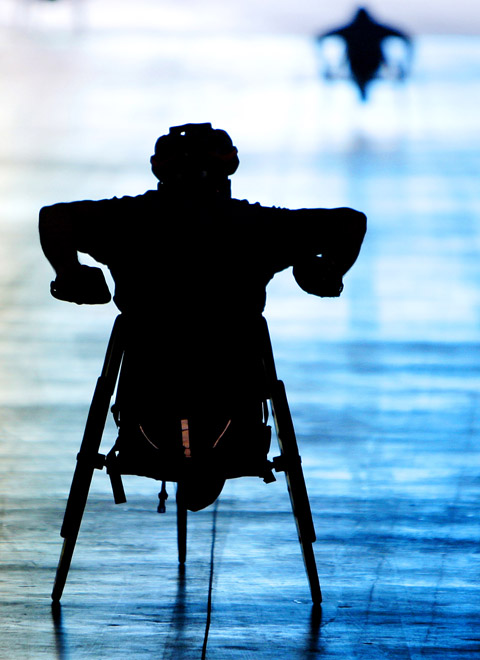Beijing has made big efforts to become more disabled-friendly ahead of the Paralympics, but handicapped residents say they will not be able to attend the Games because of a lack of transport to venues.
The situation highlights the struggles faced by the 1 million disabled people in the Chinese capital, where government programs offer support but discrimination and the chaotic nature of the city mean daily hardship.
In one striking example, many of Beijing’s physically handicapped own specially outfitted motorbikes, but some of them said their three-wheelers were banned from entering the Olympic Green, where most events will take place.

PHOTO: AP
“Even if I wanted to go watch the Games, they would never let me drive my three-wheeler onto the Olympic Green,” said Yu Fuye, 67, who has been paralyzed below the waist since he was three years old.
However, echoing other disabled three-wheeler drivers who also said they had no way of getting to the Games, the heavy-set and graying Yu remained enthusiastic about the Paralympics, which begin today.
“It doesn’t matter, I can watch on television. I will watch every event where China has a chance to win a gold medal,” he said.
Beijing, like the rest of China, has long proved a nightmare for disabled people who want to get around independently.
Footpaths, street intersections and footbridges have had virtually nothing to help the blind or wheelchair-bound, guide dogs have been banned on buses and access to trains has been extremely difficult.
Since winning the rights to host the Olympic Games in 2001, authorities in Beijing have sought to change all that, but problems remain.
Authorities have installed grooved paving stones on many footpaths for blind people to use as walking guides. But in many areas the guide stones are useless because cars are allowed to park on the footpaths.
Meanwhile, pedestrian crossings do not have the sound systems that tell blind people when the lights change and are common in many developed countries.
Ahead of the Paralympics, the government has also trumpeted the introduction of Beijing’s first-ever fleet of taxis with facilities for the disabled.
“I saw reports on the new handicapped taxi cabs, but they only have 70 of them, that is not enough for all of us handicapped people,” said Zhao Zhizhong, 48, who was disabled in a car accident eight years ago. “I’m sure they will be mainly for the athletes.”
One of the big projects has been to allow wheelchair access to the capital’s public transport network. However, a range of disabled people said they did not think they could yet travel on the trains.
“I have heard that we can now go on the subway, but I have never tried this. They say you have to phone ahead and they will arrange a person to help you onto the train,” said Liu Baokun, 53, who was paralyzed with a broken back 20 years ago, as he sat on his three-wheeler.
Guide dogs will also be allowed on buses for the duration of the Paralympics, but there has been no mention of the new regulation being made permanent.
Organizers of the Paralympics have said they are making arrangements for tens of thousands of disabled people to attend the Games, and have made adjustments at venues to allow greater wheelchair access.
A spokesman for the Games organizing committee did not have any comment when asked by AFP about the apparent transport problems to the venues cited by Yu, Liu and others, asking for media inquiries to be faxed through.

The pressure was already on Real Madrid coach Xabi Alonso before their 2-1 defeat to Manchester City on Wednesday in the UEFA Champions League raised further questions about his future. Arsenal remain perfect in this season’s competition and three points clear at the top of the standings after a 3-0 win against Club Brugge, while defending champions Paris Saint-Germain were held 0-0 at Athletic Bilbao. The clash between Madrid and City was the standout game of the round amid reports this week that Alonso had lost control of the locker room. Speculation over his position is likely to intensify after the latest

‘HIGH STANDARD’: The Thunder are on track for a Finals-Cup double after they scored 22 three-pointers in equaling the best 25-game start to a season in NBA history The Oklahoma City Thunder on Wednesday bagged a 16th straight victory, thrashing the Phoenix Suns 138-89 to romp into an NBA Cup semi-final clash with the San Antonio Spurs, who stunned the Los Angeles Lakers 132-119. NBA Most Valuable Player Shai Gilgeous-Alexander scored 28 points to lead the reigning NBA champions Thunder, who improved to 24-1 to equal the best 25-game start to a season in league history. They dominated from start to finish to book their place in the final four of the in-season tournament in Las Vegas, where they are tomorrow to take on the Spurs. The New York Knicks and

TOP OF THE TABLE: Evann Guessand put the visitors ahead early in the game and Flavius Daniliuc equalized before Youri Tielemans got the winner in the second half Aston Villa on Thursday extended their winning streak to eight games in all competitions with a 2-1 victory against Basel in the UEFA Europa League to secure at least a playoff spot. Villa were tied with Olympique Lyonnais, who beat Go Ahead Eagles 2-1, and Midtjylland, 1-0 winners over Genk, atop the standings of the second-tier European competition on 15 points with five wins from six games. They have bounced back from a poor start to the season and are third in the Premier League, including a 2-1 victory over leaders Arsenal on Saturday. At St Jakob-Park in Basel, summer signing Evann Guessand

Tony Jefferson intercepted a Jalen Hurts pass in overtime to give the Los Angeles Chargers a 22-19 victory over the Philadelphia Eagles on Monday in an NFL thriller between playoff contenders. Justin Herbert, playing a week after surgery on his broken left (non-throwing) hand, withstood a career-high seven sacks to throw for 139 yards and a touchdown for the Chargers. Cameron Dicker kicked five field goals, including the 54-yard game winner in overtime. The Chargers defenders forced Hurts to throw four interceptions and surrender a fumble for a career-worst five turnovers as the Eagles fell to 8-5 with a third